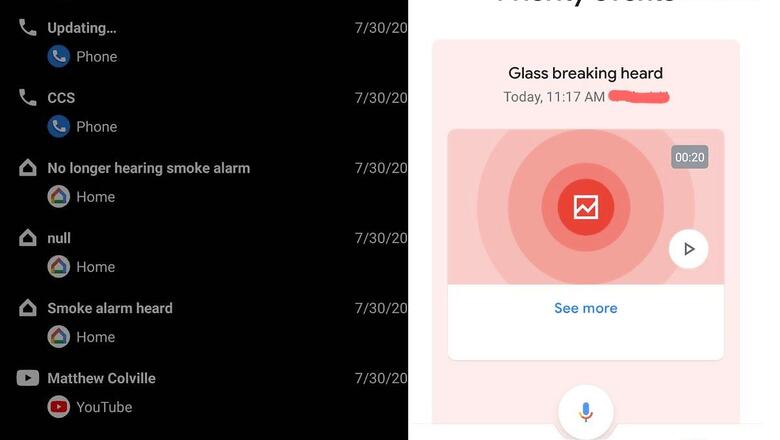
views
If you didn’t exactly have the confidence to put a smart speaker in your home, this latest development in the world of Google Nest smart speakers and smart displays will most certainly not give your confidence a boost. It turns out that Google smart speakers, which include Google Home, Google Home Mini and Google Nest Mini (2nd gen) got some secret powers via an unintended software update that gave the microphone in these smart speakers’ greater access to what was happening around them. The sounds, to be precise. Users on various online forums, including Reddit, have been sharing their experiences that the Google Assistant powered smart speakers in their homes seem supercharged and are notifying them about any sound they feel is worth notifying the owner about.
A Reddit user Brazedowl says his phone one day notified him about the smoke detector going off in his kitchen. What he had installed wasn’t a smart smoke detector, but what he calls a “cheap $10” install. There is no way it could have communicated anything to the Google Assistant. Yet his phone was notifying him via the Google Home app. He isn’t the only one. Another user vjpal also writes on Reddit that Google Home alerted him that there had been a “glass breaking hard” incident at their home. The child had accidentally dropped and broke a glassware. But why was this happening? It turns out, Google had warned us about such a smart feature back in May when it announced support for “critical sounds”. However, that was supposed to be rolled out to paying subscribers for the Nest Aware Home Security subscription. “Your Nest speakers and displays will notify you if a critical sound is detected, like a smoke alarm or glass breaking, by sending an alert to the Home app. From there, you can hear an audio clip or listen live within the Home app to confirm the alarm,” Google had said at the time.
What happened with these specific smart speakers which the users on Reddit are talking about? They accidentally got a firmware update that enabled this functionality for them. “A recent software update enabled these alerts on some of our speakers that didn't have a subscription, but we've since rolled that back,” a Google spokesperson has confirmed to Protocol. This unintended functionality has since been reverted for Google Home and Google Nest devices that got this update but are not subscribed to the Nest Aware Home Security.
In fact, if you do read through the detailed privacy and security explanation about how Google’s smart speakers and their far-field microphones work (admit it, you don’t), the company does say that, “occasionally, the Assistant will activate when you didn’t intend it to, because it incorrectly detected that you wanted its help (like by a noise that sounds like “Hey, Google”).” If this does happen and you see the lights on your speaker light up in anticipation when you aren’t actually talking to it, just say, “Hey Google, that wasn’t for you,” and the Assistant will delete the last thing it sent to Google. But the thing is, chances are we probably won’t be looking at the Google speaker sitting in one corner of the room when we aren’t addressing it directly.
The upside of all this is that this software bungle effectively demonstrates how powerful these speakers can actually be, when it comes to home security. The far-field microphones are very capable of detecting, understanding and deciphering ambient noises as well, and not just human voices. Google recently invested $450 million in home security provider ADT, for a 6.6% stake. ADT and Google will integrate and bundle-sell the former’s security solutions and Google’s smart displays, Nest security cameras, alarm systems, smart doorbells and locks. This is expected to give Google a big advantage in the smart speaker competition against Amazon and their Alexa line-up of smart displays and speakers, as well as Apple's Siri powered HomePod.
This isn’t the first time Google’s smart speakers are in the line of fire, at least from those who are concerned about their privacy. Last year, Google faced criticism when it became public knowledge that the company was using smart speakers to record conversations in the background, which were then being analyzed by real humans, to improve audio detection capabilities. Google then announced that users could choose to opt in for “Voice & Audio Activity,” which allows Google to have a team of humans listen to your Google Assistant recordings to improve the voice assistant.




















Comments
0 comment